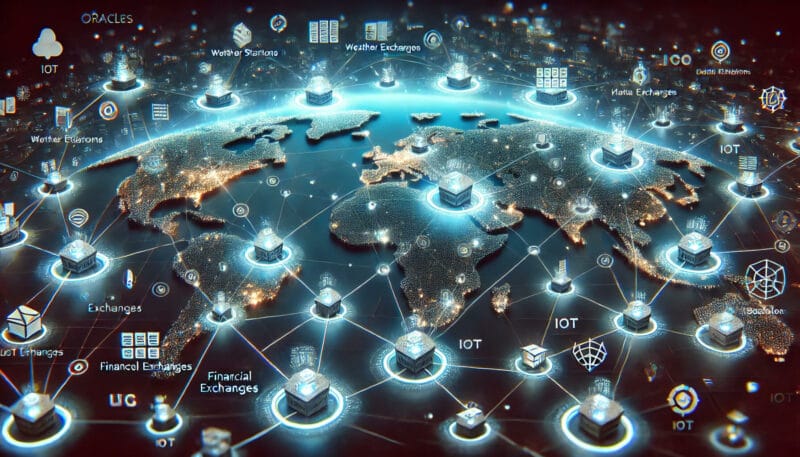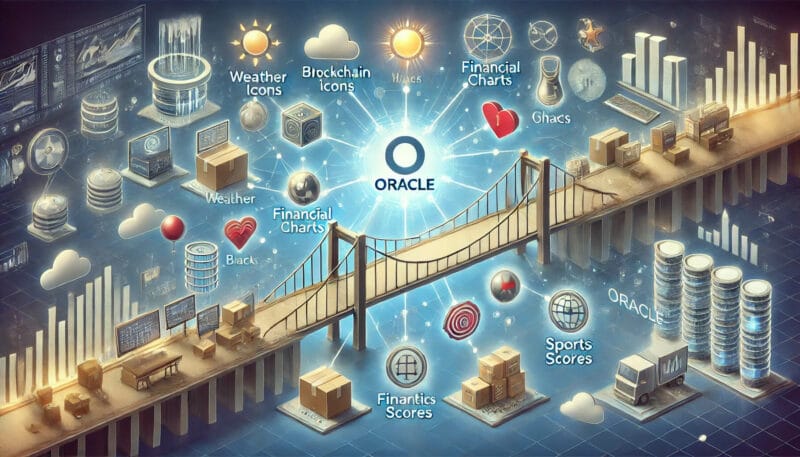1. Introduction: Understanding Oracles in Blockchain
Blockchain technology has revolutionized the way we think about data security, transparency, and decentralization. One of the most significant innovations within blockchain is the smart contract—self-executing contracts with the terms of the agreement directly written into code. However, smart contracts, by design, can only interact with data that is already on the blockchain. This limitation prevents them from accessing real-world data, which is essential for many use cases, such as weather conditions for insurance contracts or exchange rates for financial agreements. This is where oracles come into play.
Oracles are third-party services that provide external data to smart contracts on the blockchain. They act as a bridge between the blockchain and the outside world, enabling smart contracts to interact with off-chain data. By feeding real-world information into the blockchain, oracles unlock a wide range of possibilities for and smart contracts.
Why Oracles Matter for Blockchain Technology:
Oracles are essential for connecting smart contracts with external data sources, allowing blockchain networks to interact with real-world events and information.
2. What Are Blockchain Oracles?
Blockchain oracles are entities that connect blockchains to external data sources, allowing smart contracts to access real-world information. Oracles can provide various types of data, including prices, weather conditions, sports results, and more. This data is then used by smart contracts to execute transactions or trigger events based on predefined conditions.
Oracles come in different forms, each serving a specific purpose in the blockchain ecosystem:
- Software Oracles: These oracles interact with online data sources, such as APIs, to provide information like prices or market data.
- Hardware Oracles: Hardware oracles gather data from physical sensors or IoT devices, such as temperature or humidity readings, and feed this data into the blockchain.
- Inbound Oracles: These oracles provide data to the blockchain from external sources, enabling smart contracts to act on real-world events.
- Outbound Oracles: Outbound oracles send information from the blockchain to external systems, allowing smart contracts to trigger actions outside the blockchain.
- Key Concepts of Oracles:
- Data Connection: Oracles provide the crucial link between blockchain and external data sources.
- Types of Oracles: Different types of oracles (software, hardware, inbound, outbound) cater to specific data needs.
- Real-World Interaction: Oracles enable smart contracts to respond to real-world events and information.
3. The Importance of Oracles in Blockchain Technology
Oracles play a vital role in enhancing the functionality and versatility of blockchain networks. Here’s why they are so important:

3.1 Enabling Smart Contracts to Access Real-World Data
The most crucial function of oracles is to provide smart contracts with access to real-world data. Without oracles, smart contracts would be limited to the data available on the blockchain, restricting their applicability. Oracles allow smart contracts to interact with external data sources, enabling them to perform tasks based on real-world events. For example, a smart contract for crop insurance can use a weather oracle to determine if a drought has occurred, triggering a payout to the farmer.
- Key Benefits:
- Real-World Integration: Oracles allow smart contracts to access and use real-world data.
- Expanded Use Cases: By connecting to external data, oracles enable a broader range of applications for smart contracts.
- Automation: Oracles automate the process of fetching and verifying external data for smart contracts.
3.2 Enhancing Decentralized Finance (DeFi) Applications
In the rapidly growing world of decentralized finance (DeFi), accurate and timely data is crucial for the functioning of various financial instruments, such as loans, derivatives, and . Oracles provide the necessary data, such as asset prices and exchange rates, to DeFi platforms, ensuring that smart contracts execute transactions accurately. For instance, a lending platform might rely on an oracle to determine the collateral value of a cryptocurrency before approving a loan.
- Key Benefits:
- Accurate Pricing: Oracles provide up-to-date price data, which is essential for DeFi applications.
- Reliable Data Sources: Oracles ensure that smart contracts in DeFi have access to trustworthy data.
- Financial Automation: DeFi platforms use oracles to automate complex financial transactions.
3.3 Increasing Trust and Transparency in Smart Contracts
Oracles also play a role in enhancing the trust and transparency of smart contracts. By providing data from multiple sources, oracles can ensure that smart contracts operate based on accurate and verified information. This multi-source verification helps prevent manipulation and increases the reliability of the data used by smart contracts. Additionally, the use of decentralized oracles—where multiple independent oracles provide data—can further enhance trust and reduce the risk of a single point of failure.
- Key Benefits:
- Multi-Source Verification: Oracles use data from multiple sources to ensure accuracy and prevent manipulation.
- Decentralization: Decentralized oracles reduce the risk of a single point of failure and enhance trust.
- Transparency: Oracles provide transparent data feeds, ensuring that smart contracts operate fairly.
3.4 Expanding the Potential of Decentralized Applications (dApps)
rely on smart contracts to function. By enabling smart contracts to access real-world data, oracles significantly expand the potential use cases for dApps. From insurance and finance to supply chain management and gaming, oracles make it possible for dApps to offer services that require interaction with external data. For example, a dApp for decentralized sports betting can use oracles to obtain live scores and results, ensuring fair and transparent betting outcomes.
- Key Benefits:
- Broader Use Cases: Oracles enable dApps to offer services that require real-world data.
- Real-Time Interaction: Oracles provide real-time data, allowing dApps to respond to events as they happen.
- Versatility: The ability to access various types of data makes dApps more versatile and functional.
4. Challenges and Considerations with Blockchain Oracles
While oracles offer many benefits, they also introduce certain challenges and considerations that need to be addressed:
4.1 Security and Trust Issues
One of the primary concerns with oracles is security. Since oracles bring external data into the blockchain, they can become a target for attacks. If an oracle provides incorrect or manipulated data, it could compromise the smart contract’s integrity, leading to incorrect outcomes or financial losses. Ensuring the security and trustworthiness of oracles is essential for maintaining the reliability of the blockchain network.
- Key Challenges:
- Data Manipulation Risk: Oracles can become a target for attacks if they provide incorrect data.
- Security Measures: Implementing robust security protocols is crucial to protect oracles from attacks.
- Trustworthiness: Ensuring that oracles provide accurate and reliable data is essential for smart contract integrity.
4.2 Centralization Concerns
While blockchain networks are decentralized, some oracles may operate in a centralized manner, creating a potential single point of failure. Relying on a single oracle for data can introduce centralization risks, which contradict the decentralized nature of blockchain. To mitigate this risk, decentralized oracle networks, where multiple independent oracles provide data, can be used to ensure data accuracy and reliability.
- Key Challenges:
- Centralization Risks: Relying on a single oracle can create a single point of failure.
- Decentralized Oracle Networks: Using multiple oracles reduces centralization risks and enhances data reliability.
- Balancing Efficiency and Decentralization: Ensuring that decentralized oracles operate efficiently while maintaining decentralization is a key challenge.
4.3 Latency and Speed Issues
Oracles must deliver data to the blockchain in a timely manner, especially for applications that require real-time data. However, delays in fetching or processing data can lead to latency issues, affecting the performance of smart contracts. Ensuring that oracles provide accurate and up-to-date information without significant delays is crucial for maintaining the efficiency of blockchain networks.
- Key Challenges:
- Timely Data Delivery: Oracles must provide data quickly to avoid latency issues.
- Real-Time Requirements: Applications that rely on real-time data need oracles that can deliver information promptly.
- Efficiency: Balancing the speed of data delivery with accuracy is essential for oracle performance.
5. The Future of Blockchain Oracles
As blockchain technology continues to evolve, the role of oracles will become increasingly important. Innovations such as decentralized oracle networks, which use multiple independent oracles to provide data, will enhance the security and reliability of oracles. Additionally, advancements in hardware oracles and integration with emerging technologies like the Internet of Things (IoT) will further expand the possibilities for smart contracts and decentralized applications.
- Key Trends:
- Decentralized Oracle Networks: These networks will become more prevalent, reducing centralization risks and enhancing data reliability.
- IoT Integration: Oracles will increasingly connect with IoT devices, providing real-time data for various applications.
- Advancements in Oracle Technology: Innovations in oracle technology will continue to expand the potential of smart contracts and dApps.
Conclusion: Oracles as the Bridge Between Blockchain and the Real World
Oracles play a critical role in the blockchain ecosystem by bridging the gap between decentralized networks and real-world data. By providing smart contracts with access to external information, oracles unlock a wide range of possibilities for decentralized applications, from finance and insurance to supply chain management and gaming. While challenges such as security, centralization, and latency must be addressed, the importance of oracles in blockchain technology cannot be overstated. As the technology matures, oracles will continue to be a vital component in the development of scalable, efficient, and versatile blockchain networks.
For more insights and detailed analysis on blockchain technology, explore our Blockchain and Smart Contracts section.
Stay Updated
For the latest updates on blockchain oracles and smart contracts, follow us on:
Stay informed with the latest strategies and insights in the world of blockchain at FreeCoins24.io.
Special Offer
Looking to explore blockchain solutions with reliable oracles? Sign up on Bybit today and take advantage of up to $30,000 in deposit bonuses. Start building on secure and efficient blockchain networks.

















